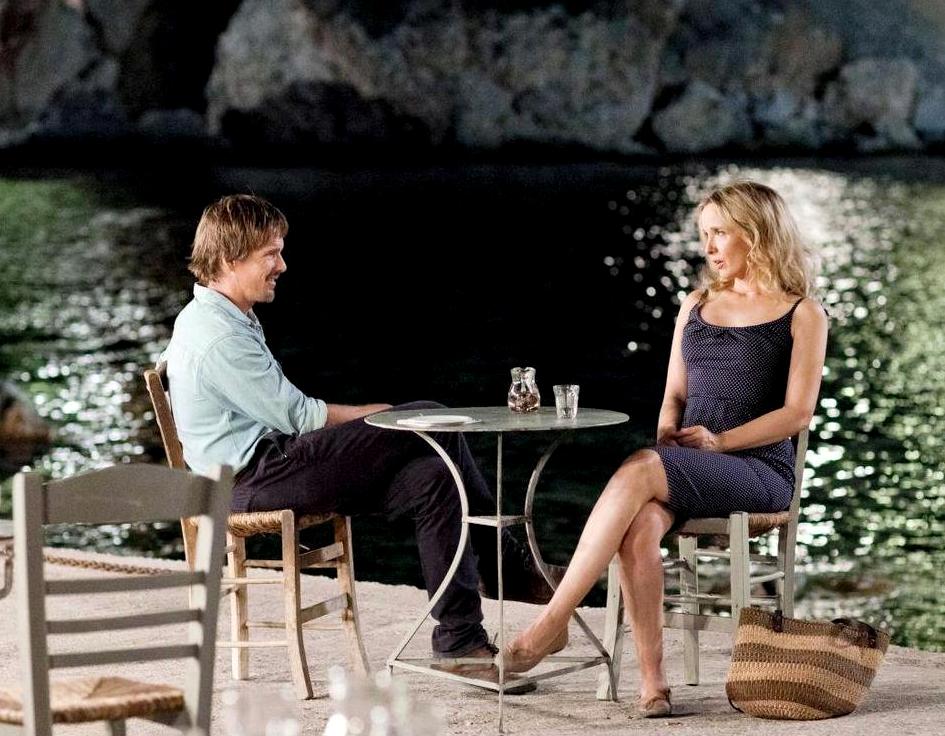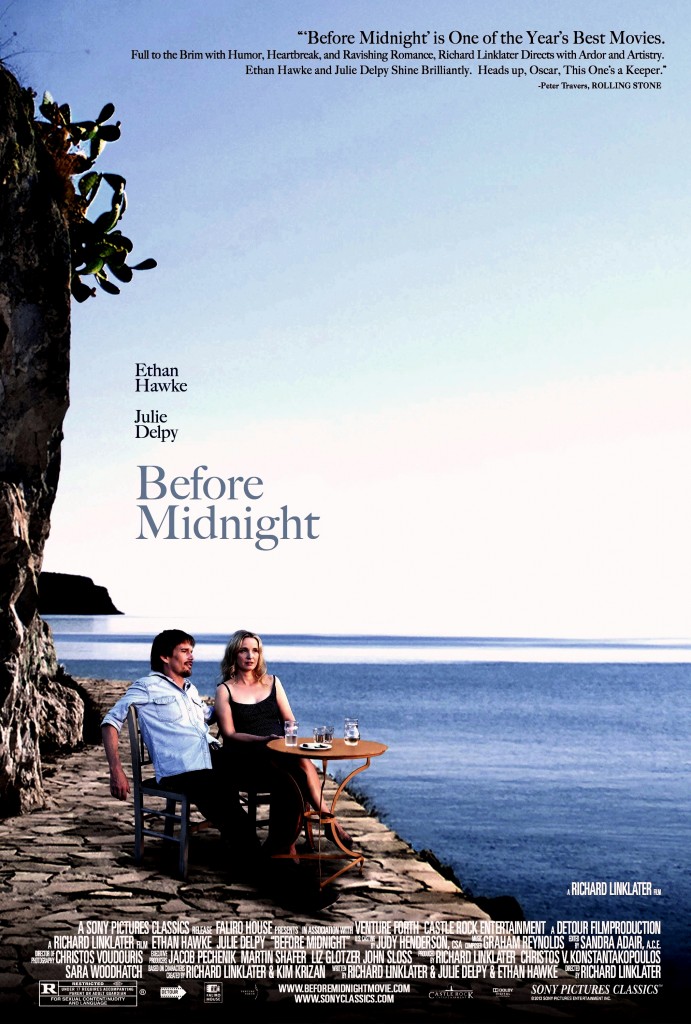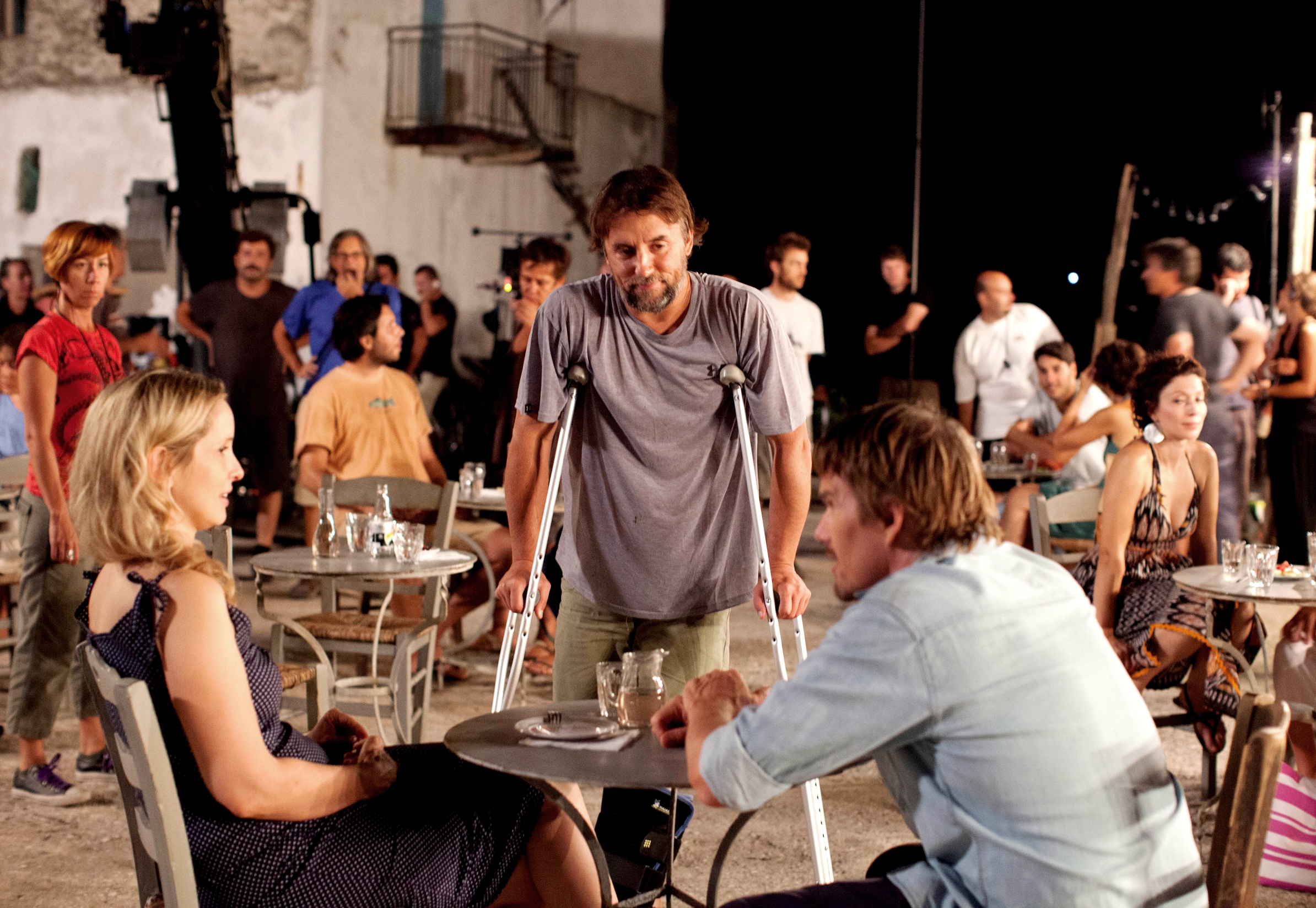
The Before Midnight press conference was held recently in Los Angeles at the Four Seasons hotel. Looking back, I attended the “Before Sunset” press junket nine years ago. I loved the 2004 film, but the junket was a basic affair with the humble talent coming into roundtables. The mood by Ethan Hawke and Julie Delpy was confiding if apologetic, as if they were thankful for trying out a different kind of film that they were unsure would be accepted. More than the 1995 original “Before Sunrise,” the sequel “Sunset” was more strictly walking and talking, but the first viewing had a really strong suspense about who would make the first move and say the right thing to reignite their long-dormant passion. The press day went like calculated clockwork, the air was gracious but enervated.
I mention this because the “Before Midnight” press day was a far more passionate, zealous interaction between press and talent. Ethan Hawke, Julie Delpy and Richard Linklater sat at a long table before us in a press conference room and fielded questions by enthusiastic journalists. I don’t remember enthusiastic journalists in 2004, besides myself.
My interpretation for this evolved mood is two things: One, these Linklater films have grown on us journalists over the years with an incomparable fondness. Two, the publicity firm handling “Midnight” has been smarter and shrewder this time with getting the film broader and louder attention.
The intention of most press junkets is to dish out some buzz words and promote a film. With “Midnight,” there are specific questions that needed to be asked. Why did you make this film? And will there be another sequel in nine years? “I don’t know yet!” Linklater shoots back. “We need a five year hiatus to think about it. We never planned on making three. It’s impossible to know anything until some years go by.” Hawke and Delpy would be in their fifties if there were to be a next time.
“We’re thrilled we ever got to make this third one. In 2004, we were getting to make this very personal film that we weren’t sure anybody cared about. We were thrilled that we ever got to make ‘Sunset’ in Paris. How are we getting away with this? Then there was this build-up, we got questions over the past nine years. Now we’ve made a trilogy, but we’ve intended each film to stand on its own,” Linklater insists.
I reflect how “Before Sunrise,” a stand-alone classic, is arguably the most romantic movie ever made. The characters Jesse and Celine met on a European train journey, they flirted, then he convinced her to get off the train in Vienna so they could walk around even though he was relying on little money. “Richard let us pick our own character names when we began this journey 18 years ago which at the time was so wonderfully strange, a funny ownership over your characters,” Hawke recalls. His continues to reminisce, saying, “I like to say I learned how to speak on camera on ‘Before Sunrise.’ As a young actor you get asked to pose or effect an emotion. But Richard wanted us to gab. To be present in front of the camera. To not act. This adventure to not act on camera.”
“You rarely get asked to act like that on camera. Maybe once in a film, to have a big monologue to tell a story. Maybe once every ten films. Usually it’s dialogue, dialogue, dialogue. One word, one word, one word. But with these films we have big chunks. It can sound really boring if you’re not super-duper natural at saying it. You have to really sound like you’re telling a story to someone you care for. That’s the real challenge of the film,” states Delpy.
How do you approach a screenplay construction on a film that emphasizes lots of words in dialogue and monologue? “We have to think about their backstory every time we start to write one line on the screenplay. You can’t start writing the second screenplay or third screenplay even more without knowing everything that has happened in-between,” Delpy says. Hawke and Delpy were more than actors on the sequels. The two of them have collaborated with Linklater as co-writers on the sequels.
“We spent 8 weeks writing and rehearsing. When you do that kind of rehearsing, it helps during the re-writing process,” Delpy explains. “It also helps that we have had the luxury of time, nine years to think about our characters.”
The characters have inevitably grown up and the squabbling is a result of their adult characters, whom are now married with children. “We are now dealing with the complexity of age. The level of truthfulness in regards to our characters has changed,” she says.
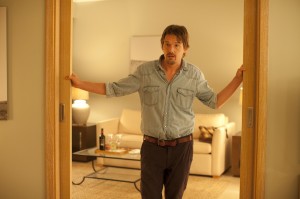 Jesse and Celine now face a dilemma in “Midnight” on whether to relocate from Paris to Chicago, for sake of family and occupation. Hawke weighs in on this complexity, saying, “It’s very easy to look at a romantic relationship when there’s the obvious bad guy. One is an alcoholic, one is abusive. But what if you were to take two well-meaning people who actually love each other and want the best for each other? It’s still hard. Anybody who has been in a long-term relationship would know… your lives can still be growing on the same road, or does one need to change the road to keep growing?”
Jesse and Celine now face a dilemma in “Midnight” on whether to relocate from Paris to Chicago, for sake of family and occupation. Hawke weighs in on this complexity, saying, “It’s very easy to look at a romantic relationship when there’s the obvious bad guy. One is an alcoholic, one is abusive. But what if you were to take two well-meaning people who actually love each other and want the best for each other? It’s still hard. Anybody who has been in a long-term relationship would know… your lives can still be growing on the same road, or does one need to change the road to keep growing?”
Delpy is urgent to emphasize her co-star’s point. “There is no bad guy in particular. Yet there still must be compromises. What compromise might jeopardize their relationship. It’s all about finding the right road,” she says. “Their relationship started with the choice that Jesse makes, to follow his heart. ‘Midnight’ continues with the consequences of such a choice.”
Linklater chimes in. “The first movie they are unattached. You see how easily they can get off a train and go home a day later and whatever. You had that looseness. We learn Jesse and Celine moved around a lot over the years when they were single and unattached. But now they’re together and you see how difficult that is. To maneuver through life with one other person and be on the exact same track. It’s tough.”
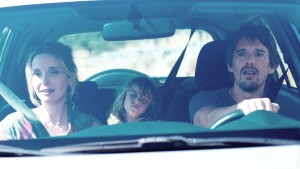 If there’s anything that looks tough in “Midnight” it’s the second scene, a supposed 14-minute car scene held by one shot, no editing. The scene is intended to set the mood for Jesse and Celine’s marriage, and to observe them in how they are as parents.
If there’s anything that looks tough in “Midnight” it’s the second scene, a supposed 14-minute car scene held by one shot, no editing. The scene is intended to set the mood for Jesse and Celine’s marriage, and to observe them in how they are as parents.
“It gives me a flashback of anxiety!” Delpy chuckles.
“The kids are the unsung heroes of that scene. Because they’re not asleep. They’re acting! So many things could have gone wrong. The girls could have woken up early and looked at the camera,” Linklater reflects.
“The girls, the car driving on the road. The lights. It’s noisy of course. A whole combination of things. And we have to act for a full 14-15 minutes. Nothing in that scene is improvised, it’s all scripted,” Delpy says.
Of course, these films have always been about richness of character. Movies have always given us guys with the complexity of Jesse, but rarely women as complex as Celine. Responding proudly is Delpy, saying, “With Celine I wanted to make sure she is a strong woman. Looking towards the future. Not someone who dwells into the past. And she’s a very active person. She can seem at times very vindictive, not going to let someone tell her what to do. She also believes if they do move to Chicago it will destroy their relationship. It’s not just about the work, I think she’s convinced of that.”
Linklater says he has received positive response from test audiences. “I’ve talked to a lot of people now who are older and they find the movie, they get charged up and it made them feel good that they see these two people who are still trying. They are still communicating, they are making each other laugh when they can. And you see them in the ring together. Often in relationships, one or both have checked out. If you’ve got problems, I’ll deal with it as minimal as I can. You see a split with people. ‘Midnight’ is a good depiction of two people who are actively working through their problems. They care enough to do so.”
Has there been anything that is an outstanding surprise to you during your perennial work on these films? “The shock that 18-years ago Julie and I auditioned for Richard… This idea that we would have this lifelong collaboration of pouring so much of ourselves into it, that’s the surprise. The fact that we get to do this and somebody is interested, that’s the surprise.”
It could end as a trilogy. But if there’s enough talk between fans and cast, and rapport between talent, then maybe in another five years new ideas of Jesse and Celeste will gestate and in another nine we could see them in their fifties.
